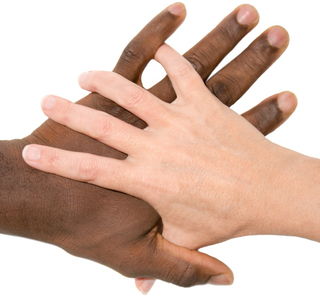Relationships
Connecting: Forging Real Relationships with People of Color
Using the science of social connection to elimate racism.
Posted August 20, 2016
by Jonathan W. Kanter, Ph.D. and Daniel C. Rosen Ph.D., guest contributors

We recently published a blog post titled, What Well-Intentioned White People Can Do About Racism, and proposed five scientifically informed suggestions to empower well-meaning white people to overcome confusion, defensiveness and despair around what to do about racism today in our society and begin a journey of learning (the new language of racism), acceptance (of difficult feelings around race and racism), exploration (of your own biases), commitment (to actively be a part of the solution) and connection (to form real relationships with others who are different from you).
This post is the last of five posts that briefly unpack each of those five suggestions. Today we are discussing the importance of taking risks to connect with people of color. While the focus of this blog series is race, these suggestions are applicable to differences (e.g., gender, religion) of all kinds. It is also worth noting that once we embrace the multiple dimensions of social identities that exist, finding anyone who is the exactly the “same” as you becomes impossible.
Make your world a less white place

Who do you usually sit next to on the bus or subway? Who surrounds you in your favorite restaurants or parks? How often do you find yourself in “all white” spaces? If you find yourself surrounded by white people most of the time, you are not alone. Research indicates that 3 out of 4 white people in this country have no non-white friends. This doesn’t happen by accident. If you are someone who values meeting and connecting with others different from you, you will need to intentionally disrupt these patterns. How? You choose. Try taking the first available seat on the bus, regardless of who is sitting next to you, without looking around for someone who makes you feel more comfortable. In fact, deliberately sit next to a person of color, and say “hello.” Talk to co-workers you don’t usually talk to. Talk to the cashier at the grocery store in a more meaningful way.
Lean in. Start to build relationships. Make your world a bigger, less white, place.
Watch for tokenism
We are not advocating what has been called “tokenism” – making sure you have your one black friend, or you have one interaction with a person of color per day. Instead, we are advocating for intentionally choosing your relationships by virtue of your values, opening up to all the people around you.
There are no rules here, other than directing your choices and actions by what matters to you rather than the auto-pilot that normally guides your social decisions.
There is often a spirit of volunteerism or charity work that comes with white anti-racist values. For example, well-intentioned religious groups may set up and staff soup kitchens or food drives for homeless or impoverished people who are disproportionately black. In these moments of charity, contact is made. To be clear, this is not what we are talking about. We are not talking about the white person caring for and trying to make life temporarily better for the vulnerable person of color in an organized setting.
Contact is not the same as connection
We are talking about leaning in and building real, genuine moments of connection with people who are different from you. We are talking about relationships characterized by equal status and power within the relationship, even if the different colors of your skins create power differences between the two of you in larger society. We are talking about relationships characterized by mutual vulnerability and caring for each other.
This may be as simple as a brief moment on a bus or the beginning of a long, intimate friendship.
This moment of considering true and meaningful interracial connections is sometimes where discomfort is greatest.
Lean in.
Watch for microaggressions and colorblindness
Scared you will say the wrong thing as you are getting to know someone? Scientists call that “intergroup anxiety,” and guess what? It’s normal. Lean in to it. And consider this: Relationships take time. The most important thing is to share yourself as you get to know people. Research with white and Latino students at the University of California-Berkeley shows that when people from different backgrounds lean in and truly get to know each other, with both dropping their guards and revealing who they really are, anxiety goes down and cross-group friendships develop (Page-Gould, Mendoza & Tropp, 2008).
You may be drawn to what is different about the other person — the stereotypes and biases will likely pop in, especially at first before you really know each other. Your brain can’t help it. Notice the stereotypes and biases that are popping in without acting on them. Don’t ask the black woman about her hair, or the Muslim woman what it is like to wear a hijab, or the black man what he thinks about the latest bit of police violence. It is possible that the other person will experience that sort of comment as a microaggression – an insult, and a form of racism (Sue and colleagues, 2007). Why? Because, even if you didn’t intend harm, you are attending to and acting on differences between you and the other person that historically have led the other person to be marginalized and you to be privileged.
This is not a recommendation to adopt color-blindness over the entire course of a relationship. Understanding someone’s identity, the ways they value and place importance on their culture, and the history that has made living with that identity challenging on a day-to-day basis, is important. Understanding these facets of someone’s identity also takes time and trust. Each person you get to know is like you in some fundamental human ways, and not like you in other ways.
Both the similarities and the differences are important. Our goal is to see the common humanity we all share, the fundamental experiences that connect all of us. We all bleed; we all experience pain and loss; we all yearn for love. At the same time, our goal is to value and respect people’s identities, to recognize that the differences that exist between us have created unequal pain and suffering, and to do so without acting on stereotypes or discriminating based on these differences.
Earn others’ trust over time
So don’t ask those questions or make those comments that pop into your head because of these obvious differences. That is – don’t ask until real trust and mutual understanding exist between the two of you, such that the other person understands that you are asking because you want to really get to know and understand them, not because you are distracted by what is different about them. Depending on the people involved and the nature of the interaction, this trust could take 5 minutes, 5 months, or 5 years.
Then, when trust is there, ask all the questions you want, in the service of understanding and caring about your friend and what matters to that person. Pay attention to when your friend doesn’t want to talk and doesn’t want to take responsibility for your education.
Do these ideas sound applicable to all meaningful relationships in your life? They are. The science of social connection teaches us that to develop meaningful relationships, each person needs to feel seen, heard, and respected.
Relationships change who we are
To us, the most important outcomes of this work are the human connections we have made with people who come from different races, cultures, and religions. These relationships change who we are and how we view the world. The world becomes smaller and less scary. Our lives become less lonely, more meaningful, more beautiful. We feel deeply connected to a global human community.
When our relationships go well, our friends feel supported, understood, and not so alone. The racist society we live in gets a little more manageable. Our friends also feel safe to point out our mistakes, knowing that we are continually re-orienting ourselves towards humility and non-defensiveness, knowing that we seek to understand how we impact others beyond our intentions.
What’s next?
What’s next is up to you. We hope these five suggestions have been helpful, but as psychologists who work with people week after week, we know that change is hard. This blog, of course, is only a beginning. Change takes time, effort, persistence, and support. Don’t do this alone.
Often the hardest part of change is just getting started. If you have ever tried to push a dead car from a standstill, you know that the hardest part is getting it moving. Once you get the wheels in motion, it becomes easier to keep it rolling.
We will be doing this work, imperfectly, alongside you. We believe it is work that requires moving from the inside out, containing daily challenges and rewards. If we take seriously Dr. King’s axiom that no one is free until all are free, if we allow ourselves to connect deeply with the pain and suffering of others that exists across our country and our globe, we can embrace our role in dismantling racism as not only as a responsibility, but an opportunity for collective liberation.
Jonathan W. Kanter, Ph.D., is a Research Associate Professor and Director of the Center for the Science of Social Connection at the University of Washington.
Daniel C. Rosen, Ph.D., is Associate Professor and Co-Director of the Center for Social Justice and Diversity at Bastyr University. The ideas expressed in this blog have been influenced by many sources, prominently two psychological treatments called Acceptance and Commitment Therapy and Functional Analytic Psychotherapy.
Return to Main Article: What Well-Intentioned White People Can Do About Racism
References
Page-Gould, E., Mendoza-Denton, R., & Tropp, L. R. (2008). With a little help from my cross-group friend: Reducing anxiety in intergroup contexts through cross-group friendship. Journal of Personality and Social Psychology, 95(5), 1080-1094.
Sue, D. W., Capodilupo, C. M., Torino, G. C., Bucceri, J. M., Holder, A. B., Nadal, K. L., & Esquilin, M. (2007). Racial microaggressions in everyday life: Implications for clinical practice. American Psychologist, 62(4), 271-286.




